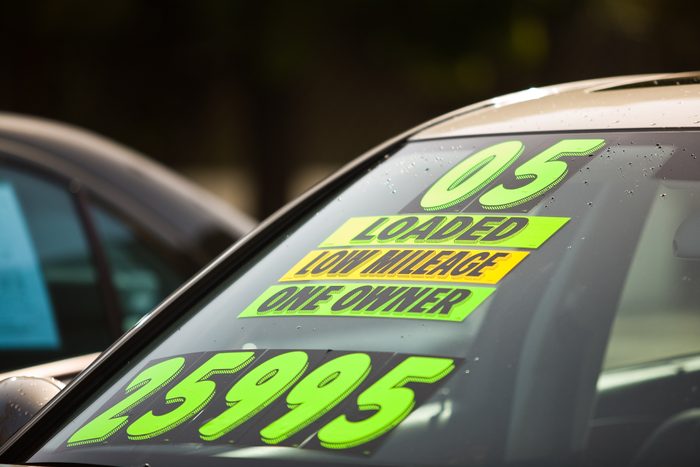6 Things I Wish I Knew Before I Bought My First Car

Don't let pushy salespeople and the pressure to add bells and whistles overwhelm you. Use these tips to buy your first car with confidence.
I went through four cars by the time I was 22, although each one served me well. Two died of old age, while the other two met their ends in unfortunate accidents. All were used cars my late father helped me purchase.
My dad had a need for speed he fulfilled with sports cars, motorcycles and airplanes. He thoughtfully selected every engine that graced his garage with the care most people put into picking a spouse.
My husband and I have bought two cars for ourselves since then — the first one gently used, and the second new. When buying each, I thought of lessons my father passed on to navigate the process. The following are my top takeaways for buying a first car.
On This Page
Project Confidence
My dad was 6-foot-3 and a dead ringer for the wrestler Stone Cold Steve Austin. He naturally projected authority; you just knew no one would take advantage of him.
While I wasn’t looking to strike fear in salespeople’s hearts, I did try to channel my inner authoritative Dad while in the dealership. Keep your head up, look people in the eye and speak with clarity and certainty. Don’t let salespeople intimidate you or steer you away from what you want.
Do Your Homework
Read up about cars you like on sites like Kelley Blue Book (KBB), Cars.com, Edmunds and J.D. Power. These sites carry reviews and safety information, and allow you to search by make, model, year, mileage range, engine type and just about any other criteria you have in mind.
They’re helpful in finding vehicles listed for sale by owners, or through a dealership, without actually contacting anyone — just yet.
- Value: KBB can tell you the estimated value of car based on its current condition, as well as its year, make and model. Comparing this to the price tag of a specific vehicle can help when it’s time to negotiate.
- Recall history: Make sure whatever part(s) subject to recall were actually replaced or repaired. This way you aren’t surprised if and when issues pop up.
- Reviews: Driver feedback reveals common complaints. This will help you decide if they’re something you can live with — and afford. Consumer Reports conducts rigorous car reviews, too, but you must buy a membership to access them.
- Repairability: If you’re considering a significantly older, luxury car or imported car, consider how easily you can find parts. Check with your mechanic to make sure it’s a car the shop works on.
Also, get feedback from others driving the vehicles you’re interested in. I asked my friends with kids how they liked their SUVs before getting ours, inquiring about trunk storage, ease of cleaning and whether there were air vents for the back seat. Bottom line: Don’t put all your stock in one source. That way you’re much less likely to pay too much, buy a lemon, or both. Another way to get info is to join a Facebook group dedicated to your vehicle. There’s likely one for the specific model and year. You can glean a ton of information from these groups.
Plus, all this research will give you an idea of what you do and don’t want, as well as how much car you can truly afford. This is essential for negotiating, and helps greatly with that aforementioned confidence.
Take a Solo Test Drive
When you take the car out for a test drive, insist on going without salespeople or current owners in the car. This way, you can focus on your observations without someone chattering in your ear. Plus, a salesperson might make you feel nervous and cut your drive short.
While you’re behind the wheel, take the car onto smooth and rough roads, on city streets and highways, and even at night if possible.
My dad would find an empty parking lot or quiet street where he could stop suddenly and drive around in swervy patterns to test the brakes and steering. I did this myself when my time came and noticed a difference in steering between the two cars I was considering. I also had better visibility in the car I ultimately bought, and it accelerated faster and smoother onto the freeway.
Keep DIY Maintenance in Mind
Purchasing a car I can maintain myself takes top priority. If you perform a lot of your own car maintenance, or hope to, pop the hood to see what you’ll be working with.
How accessible is the oil filter? The air filter? The fluid reservoirs? Will it take a host of tools to move components out of the way just to change the oil? Those old clunkers I drove as a young adult had four hoses to detach to get at the oil filter.
Shopping for my first car without my dad, one of the first things I did was ask where the oil filter was. When the salesperson pointed to it sitting free and clear at the top of the engine, I almost cried with relief.
Get a Free Vehicle History Report
Once you’ve narrowed the field to the top candidates, get a vehicle history report. Dealerships typically give you one free. If you’re buying direct, go through the National Insurance Crime Bureau; no need to pay $25 or so from other sources. NICB tells you if the car has ever been stolen or reported as a total loss — exactly the information you’re looking for.
Stay Focused in the Finance Department
Buying our first new car was a smooth experience until the finance department started offering us extras that threatened to hike up the price.
It can feel like you’re sitting in the finance office forever, your head spinning with numbers, until you don’t know what you’re saying yes to. Hold firm! You don’t have to give a “yes” immediately, so ask for time to think things through if you need to.
Perhaps better yet, line up financing beforehand at your local credit union, which likely has the lowest rates around. That was certainly our experience. All we had to do was become a member and open a savings account with a nominal balance.



